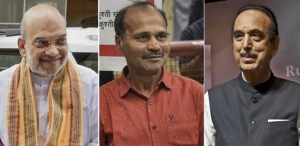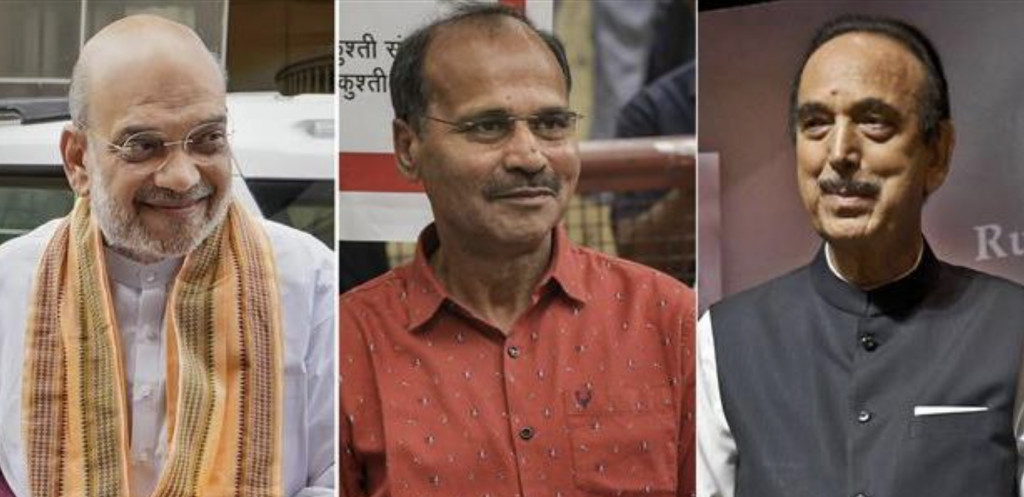NEW DELHI: The idea of holding simultaneous elections for the

, state assemblies, municipalities, and panchayats was brought up by the government on Saturday, and an eight-member high-level committee was appointed to look into it and provide suggestions as soon as possible. Home Minister Amit Shah, Congressleader Adhir Ranjan Chowdhury, former Rajya Sabha opposition leader Ghulam Nabi Azad, and former finance commission chairman N K Singh will all serve on the committee, which will be led by former president Ram Nath Kovind. The notification did not include a deadline for submitting the report but stated that the panel will start working immediately and offer recommendations “at the earliest.”The opposition group INDIA, who were holding their conclave in Mumbai, were taken by surprise by the decision to form a committee under the former president Kovind on Friday, which increased the political fervour. The decision had been denounced by the opposition alliance as a “threat” to the federal government of the nation. Subhash C. Kashyap, a senior lawyer, Harish Salve, and Sanjay Kothari, a former chief vigilance commissioner, will also serve on the high-level committee. Arjun Ram Meghwal, the law minister, will be a special invitee to the committee meetings, while Niten Chandra, the law secretary, will serve as the panel’s secretary. The committee will review and make recommendations for specific revisions to the Representation of the People Act, the Constitution, and any other laws and regulations that would need to be changed in order to hold simultaneous elections. Additionally, it has been asked to “specifically suggest the phases and timeframe within which simultaneous elections may be held if they cannot be held in one go” and to provide a framework for synchronising elections. Additionally, it will assess whether state ratification of the proposed Constitutional revisions is necessary and make a recommendation. Certain Constitutional amendments need to be ratified by state assembly in a majority of the states.After being approved by Parliament, the bill that aimed to establish a National Judicial Appointments Commission was ratified by more than 50% of the states. The committee will also examine and make recommendations for potential responses to situations like a hung House, the adoption of a motion of no confidence, a defection, or any other similar occurrence in the event of concurrent elections. Additionally, “necessary safeguards for ensuring the continuity of the cycle of simultaneous elections” and “necessary amendments to the Constitution so that the cycle of simultaneous elections is not disturbed” have been requested of the committee. The panel will also discuss logistics since the extensive exercise will call for more EVMs, paper-trail machines, polling staff, and security personnel.The adoption of a single electoral roll and electoral identity cards for voter identification in elections for the Lok Sabha, state legislative assemblies, municipalities, and panchayats will also be examined. A shared electoral roll will help cut costs and avoid people from being deployed for work that another agency is already engaged on, according to a recent report from a legislative committee. The committee will listen to and consider any speakers, arguments, and communications that it believes will help it complete its recommendations.State election commissions conduct local body elections whereas the Election Commission is mandated to conduct parliamentarian and assembly elections. According to the Constitution, the EC and SECs are different organisations with a set mission. The original plan was for simultaneous elections for the Lok Sabha (543 MPs), Vidhan Sabha (4120 MLAs), and Panchayats/ Municipalities (30 lakh members), according to former chief election commissioner SY Quraishi. The Saturday notification noted that from 1951–1952 to 1967, when this cycle was broken, elections for the Lok Sabha and legislative assemblies were typically held at the same time. Today, elections are held nearly every year and within a year at various times, resulting in significant expenditure on the part of the government and other stakeholders.Additionally, it causes the security forces and other election officials to be diverted from their main responsibilities for noticeably longer periods of time. It claimed that due to the Model Code of Conduct’s lengthy adoption, frequent polls impede developmental efforts.


